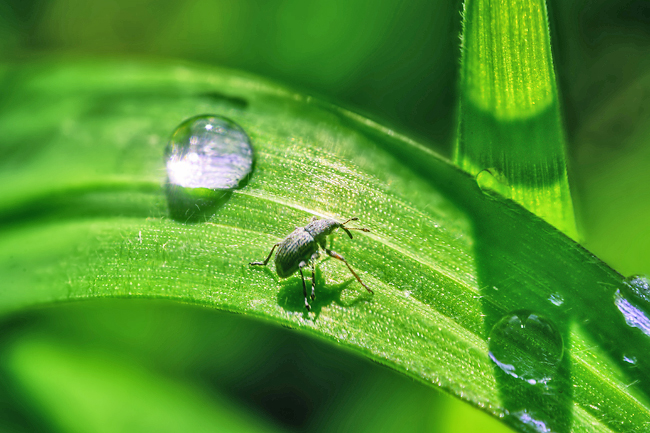Richard Sima
THE WASHINGTON POST – Not many people have held a human brain in their hands, but I am among a lucky few.
I remember the weight of it, both physical and metaphorical. The brain itself was probably three pounds of flesh – firm but pliable to the touch, and smelling strongly of preservative. I cupped it in both hands for fear of dropping it.
Holding the brain, I couldn’t help but think how this was a person in my hands, and their thoughts, feelings, hopes, fears and dreams – a whole life – were embodied in its folds and creases.
At the time, I could not name exactly what I was feeling – the giddiness, the slight lightheadedness, the catching of the breath – but looking back, I know I was feeling awe.
THE BENEFITS OF SEEKING AWE
As a neuroscientist-turned-science-journalist, one of my goals in writing this weekly column is to reveal the wonder and mystery of the brain, and why it matters in our everyday lives.
And there’s no better place to start than to explore our ability to experience awe, and how seeking awe-inspiring experiences can improve our well-being.


Awe has two fundamental components, say researchers who study the emotion. It is a response to encountering something more vast, complex, or mind-blowing than we had conceived of either physically or conceptually. The experience also induces a change in how we see the world, producing “little earthquakes in the mind.”
To understand the concept of awe, it helps to know how the brain responds to what we perceive as mundane. Over the course of our lives, our brains learn and encode what “normal” is and predict what we think should happen next, based on our internal understanding of the world.
“That prediction of what happens next guides our behaviour. It is crucial for being able to function in this incredibly complicated world,” said associate professor of social psychology at Arizona State University Michelle “Lani” Shiota. “But it does narrow our perspective, it narrows our vision. And it simply doesn’t account for everything.”
Research has repeatedly found that experiencing something extraordinary may make us (and our worries) feel small. And not in a bad way.
“You know, by adulthood, we move through the world pretty immersed in our own concerns, our own minutiae of the day-to-day, our own responsibilities, and it can be hard to keep a sense of perspective about how that fits into the grand scheme of things,” Shiota said.
Experiencing more awe is associated with living healthier and more meaningful lives. A 2021 study reported that feeling more awe is correlated with reporting feeling lowered levels of daily stress.
Intriguingly, people who feel more awe also tend to have lower levels of inflammatory cytokines.Positive experiences of awe have also been found to increase feelings of well-being, life satisfaction and sense of meaning.
By becoming less attuned to ourselves and more attuned to the rest of the world, awe helps us re-contextualise ourselves, said associate professor of psychological science at the University of California at Irvine Paul Piff.
“It helps make you feel like there’s more going on in the world than just you. And it gives you that sense of being a part of something much bigger than yourself,” he said.
Emerging research shows that experiencing awe may make us more curious, creative and compassionate people.
And in turn, recent studies have found, awe-prone people may be more prone to being curious, and people who experience more awe also tend to be more creative.
Awe leads people to feel more connected with others and identify with more universal categories such as “a person” or “inhabitant of earth”, as opposed to more individualistic, limited ones.
In different studies, when researchers induced awe in participants in laboratories, such as by showing panoramic clips of places on Earth, people behaved more prosocially, being more likely to help out, donate more money and volunteer more time for strangers.
By transforming our sense of self and meaning, and enhancing our relationship with others and the wider world, awe has the power to improve our mental and physical health.
ELICITING AWE IN THE EVERY DAY
You don’t need to visit the Grand Canyon, witness the birth of your child or hold a brain to experience awe. The awe-inspiring is all around you.
“Awe is related to this sense of oneness with humankind,” Piff said. “I think you can have your mind blown in more mundane, minuscule ways in even everyday settings.”
While more research needs to be done on what best elicits awe, many paths lead to awe. Piff offers these suggestions:
-Viewing something giant such as a mountain range or ocean.
-Discovering something tiny such as the worlds seen through a microscope.
-Contemplating a piece of music or (re)discovering a piece of art.
-Taking “awe walks” through your neighbourhood or in nature, which is a never-ending source of awe.
His favourite suggestion, though, is to just take a walk out the door.
Once you step outside, pick a random number between one and 100. Take that number of steps, and look beneath your feet. If you look around to find something inspiring, odds are you will, Piff said. “And I bet you, when you’ve tried to do it, you will do it,” he said.
The awe-inspiring is also within you. Not everyone will have the experience of holding a brain in their hands, but we are blessed with a brain conveniently held in our head.
Our brains are capable of astounding mental achievements – launching spaceships to planets millions of miles away, creating effective vaccines to combat pandemics – and coordinating our bodies to perform physical feats.
But your brain is performing equally wondrous functions right this instance, perhaps without you knowing.
Your brain is perceiving squiggles on a page and transforming them into meaning, while putting them into a broader context by remembering what came before.
It is filtering out extraneous sounds around you, the touch of clothing on your skin.
Because of your brain, you are simultaneously maintaining the muscle tone to keep whatever posture you are in and breathing unconsciously.
Your brain – 80 billion-some neurons relaying electrical and chemical signals across approximately 100 trillion connections – is sensing, feeling, deciding, evaluating, planning, adjusting and keeping you alive.
And in considering all these concurrent acts and duties, you are maybe even experiencing a twinge of awe, a feeling our brain allows us to experience – and is also a source of.
And that is pretty awesome.







